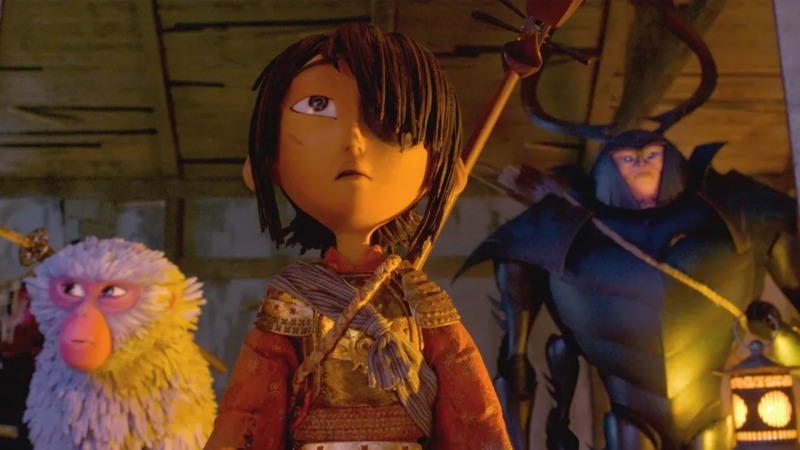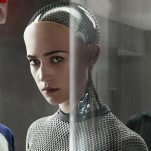The 20 Best Kids Movies on Netflix Right Now (September 2025)

A great kids movie is a beautiful and rare thing. As a father of three, I’ve suffered through enough bad kids entertainment to be enormously thankful for filmmakers who take the same kind of care in crafting movies aimed at children as those geared toward a more discerning adult audience. Netflix’s catalog of Children & Family movies ranges from terrible to fantastic, and the following guide is meant to help you avoid the former. The latter comprise the best kids movies on Netflix. Some of these movies you’ve probably already seen even if your kids haven’t. But we also tried to point out some less-obvious options, as well, including films from around the world. There are superheroes and, of course, plenty of cuddly anthropomorphic animals. We’ve included anything Netflix lists as “Children & Family.”
Here are the 20 Best Kids Movies on Netflix right now:
1. Guillermo del Toro’s Pinocchio
Year: 2022
Director: Guillermo del Toro, Mark Gustafson
Stars: Ewan McGregor, David Bradley, Gregory Mann, Ron Perlman, Finn Wolfhard, Christoph Waltz, Tilda Swinton, Cate Blanchett
Rating: PG
Guillermo del Toro has never shied away from infusing the harsh realities of life and death into the journeys of his young protagonists. His fascination with the intersections of childhood innocence and macabre whimsy are what make him the ideal co-director of Netflix’s newest Pinocchio adaptation, a work that marvelously marries the filmmaker’s flair for dark fantasy with the equally strange fairy tale elements of Carlo Collodi’s 1883 The Adventures of Pinocchio. Like all successful marriages, Guillermo del Toro’s Pinocchio brings out the very best of both parties. The stop-motion musical is an artistic triumph that colors Collodi’s cherished storybook characters with humanity and depth to craft a mature tale about rebellion, mortality and the love between a parent and child. This rendition marks the 22nd film adaptation of the Italian novel, and while it remains true to the grisly nature of Collodi’s original stories, it boldly departs from its dated moral lessons. In The Adventures of Pinocchio (and notable renditions thereafter), Pinnochio’s many escapades are structured as cause-and-effect narratives that serve to caution children against defiant behavior. In Disney’s 1940 animated feature, an evening of fun and relaxation on “Pleasure Island’’ nearly turns the wooden boy into a salt-mining donkey. In the original serial La Storia di un Burattino, delinquent behavior leads him to a gruesome death. These values of compliance and servility are reversed by del Toro’s fascist setting. In his Pinocchio, disobedience is a virtue—not a crime. These moral examinations are given a sense of urgency in death—a theme that informs so much of the film’s mind and soul. Where previous adaptations are preoccupied with life—with the puppet’s extraordinary consciousness and the hope that he may someday become a “real boy”—del Toro’s Pinocchio is interested in what our mortality can teach us about being human. In the film, death is never too far away from the protagonist or his loved ones. Death touches Carlo, then remains close to Pinocchio throughout his epic journey. The beauty of del Toro’s Pinocchio is that death isn’t treated with the usual dread and cynicism we typically see in the Western world. Here, death is mysterious, ethereal, soaked in gorgeous blue light. Death is not something to be feared, but respected and accepted when the time comes, because the notion that we will someday—maybe unexpectedly—leave this earth is what makes our time here so beautiful. I don’t typically advise listening to crickets, but believe Sebastian J., because the story of Pinocchio has never been told quite like this.—Kathy Michelle Chacón
2. Kubo and the Two Strings
Year: 2016
Director: Travis Knight
Stars: Art Parkinson, Charlize Theron, Matthew McConaughey, Ralph Fiennes, Rooney Mara
Rating: PG
Most parents give their kids a curfew, but most kids aren’t related to kabuki-masked wraiths and heartless lunar gods who want to murder them, either. Seems like good incentive for Kubo (Art Parkinson) to listen to his mother, which he does until he doesn’t. The minute he breaks mom’s number one rule, Kubo endures the world’s most unfortunate family reunion and undertakes the quest for his birthright, guarded along the way by an ill-tempered monkey and a flaky man-beetle-warrior, named, respectively, Monkey (Charlize Theron) and Beetle (Matthew McConaughey). Yes, fine, Kubo and the Two Strings doesn’t go deep in the tank for character names. Big deal. The film funnels imagination into an Erlenmeyer flask where narrative reacts with aesthetic. It’s a stunningly rendered adventure that treats style and substance as one and the same.—Andy Crump
3. Wallace & Gromit: Vengeance Most Fowl
Year: 2024
Director: Nick Park, Merlin Crossingham
Stars: Ben Whitehead, Peter Kay, Lauren Patel, Reece Shearsmith
Rating: PG
It’s a testament to the effectiveness of an animated story if it can immerse you in its setting and familiarize you with the essence of its characters in a matter of minutes, even if the setting and characters in question are beloved icons that are nevertheless almost totally unknown to the viewer. And that makes the instantly approachable nature of creator Nick Park’s work all the more apparent in the upcoming, Netflix-hosted feature film Wallace & Gromit: Vengeance Most Fowl–within minutes of sitting down to stream a press preview, it began to feel like I’d known the titular duo for decades already. That’s how winningly and simply effective the archetype of these characters remains to this day–it doesn’t matter if you don’t know a thing about them; they still win you over immediately.
This kind of joyful, cheerful excess is the through-line of Wallace & Gromit: Vengeance Most Fowl, from the duo’s massively overengineered home filled with gadgets to solve nonexistent problems, to the steadily mounting action sequences that make up the film’s third act, the highlight of which involves a slow-speed canal boat chase that somehow builds itself to life-or-death stakes. The light satire on technological dependency, meanwhile, is appreciated but almost unnecessary in comparison with the simple joys of the lovingly detailed stop-motion animated movements and expressiveness. The film’s entire arc, in fact, is more or less entirely predictable, but it just doesn’t matter–it’s an old-fashioned charmer that only registers as that much more refreshing for the lack of similarly animated fare in the modern industry. And yes, that includes Aardman Animations Limited’s own disappointing return to Chicken Run with last year’s Dawn of the Nugget. Unlike that would-be franchise, the central, wholesome allure of Wallace & Gromit remains undiminished. —Jim Vorel
4. The Mitchells vs. the Machines
Year: 2021
Director: Mike Rianda, Jeff Rowe (co-director)
Stars: Abbi Jacobson, Danny McBride, Maya Rudolph, Eric Andre, Fred Armisen, Beck Bennett, Olivia Colman
Animated generational divides have never been more like a sci-fi carnival than in The Mitchells vs. the Machines. Writer/director Mike Rianda’s feature debut (he and co-writer/director Jeff Rowe made their bones on the excellently spooky, silly show Gravity Falls) is equal parts absurd, endearing and terrifying. It’s easy to feel as lost or overwhelmed by the flashing lights and exhilarating sights as the central family fighting on one side of the title’s grudge match, but it’s equally easy to come away with the exhausted glee of a long, weary theme park outing’s aftermath. Its genre-embedded family bursts through every messy, jam-packed frame like they’re trying to escape (they often are), and in the process create the most energetic, endearing animated comedy so far this year. And its premise begins so humbly. Filmmaker and animator Katie (Abbi Jacobson) is leaving home for college and, to get there, has to go on a road trip with her family: Rick (Danny McBride), her Luddite outdoorsy dad; Linda (Maya Rudolph), her peacemaking mom; and Aaron (Rianda), her dino-freak little brother. You might be able to guess that Katie and her dad don’t always see eye-to-eye, even when Katie’s eyes aren’t glued to her phone or laptop. That technocriticism, where “screen time” is a dirty phrase and the stick-shifting, cabin-building father figure wants his family to experience the real world, could be as hacky as the twelfth season of a Tim Allen sitcom. The Mitchells vs. the Machines escapes that danger not only through some intentional nuance in its writing, but also some big ol’ anti-nuance: Partway through the trip, the evil tech companies screw up and phone-grown robots decide to shoot all the humans into space. This movie needed something this narratively large to support its gloriously kitchen-sink visuals. The Sony film uses some of the same tech that made Spider-Man: Into the Spiderverse look so crisp and unique, adding comicky shading to its expressive CG. In fact, once some of the more freaky setpieces take off, you wouldn’t be surprised to see Miles Morales swing in to save the day. The Mitchells vs. the Machines’ spin on the Spidey aesthetic comes from meme and movie-obsessed Katie, whose imagination often breaks through into the real world and whose bizarre, neon and filter-ridden sketchbook doodles ornament the film’s already exciting palette with explosive oddity. This unique and savvy style meshes well with The Mitchells vs. the Machines’ wonderfully timed slapstick, crashing and smashing with an unexpected violence, balanced out with one truly dorky pug and plenty of visual asides poking fun at whatever happens to be going on.—Jacob Oller
5. Nimona
Year: 2023
Director: Nick Bruno, Troy Quane
Stars: Chloë Grace Moretz, Riz Ahmed, Eugene Lee Yang, Frances Conroy, Lorraine Toussaint, Beck Bennett, Indya Moore, RuPaul, Julio Torres, Sarah Sherman
Rating: PG
You know that joke about how we would all side with the queer-coded villains of our childhood? ND Stevenson’s now decade-old webcomic-turned-graphic-novel Nimona is a commitment to that bit. Like its source material, Nimona is a legend for the freaks and the queers, a story told in figures, archetypes and tropes. Nimona understands that villains are often made villainous for their bodies and identities. Nimona embraces queer coding and turns it into a subversive power fantasy. In the original webcomic, Nimona is a queer anarchist revolutionary who adopts the brown-skinned, disabled Boldheart as her master. He has found himself conned into maintaining the status quo as the villain that the forces of power in his kingdom need, but he gets to prolong his homoerotic rivalry with his nemesis and ex-lover, the Institute’s champion and white pretty boy, Goldenloin. Together, Nimona and Boldheart can, through villainy, actually take down the shockingly malicious Institute that maintains strict order over the kingdom and inspire their followers to see the world differently. There’s no sympathizing with royalists here. You should absolutely go read Nimona. It won’t take much longer to read than it will to watch the 99-minute film (and you should watch it after), but with that space, Stevenson establishes and subverts the archetypes and tropes that shape not just narrative, but world view. It’s not subversive of just form or structure, but of narrative and ideology. Now in the hands of Spies in Disguise directorial duo Nick Bruno and Troy Quane, Nimona is roughly the same chaotic gremlin that fans of Stevenson’s work loved—with some notable reworks to fit into an animated kids movie on Netflix. It kinda skips the whole villain arc of the original story, which I would be more annoyed about if the many other adjustments and the reworked scope didn’t make this such a good standalone adaptation. The movie still captures the heart of Nimona. It may make for a less subversive take on villainy, but remains a thoughtful commentary on systems of power and the othering of non-normative bodies. In many ways, it feels tailored for this moment, for this audience. —Autumn Wright
6. The Monkey King
Year: 2023
Director: Anthony Stacchi
Stars: Jimmy O. Yang, Bowen Yang, Jo Koy, Stephanie Hsu, BD Wong
Rating: PG
The Monkey King journeys to the Western streaming services once more with Netflix’s animated adventure from director Anthony Stacchi (The Boxtrolls, Open Season). As a notorious trickster figure of Chinese mythology, The Monkey King’s story is told time and again. His appearance in the 16th century epic Journey to the West, in which he atones for his misdeeds by aiding a Buddhist monk traveling to India in search of scriptures, makes him a mischievous yet reforming character who models and satirizes ancient Chinese values. Netflix’s delightful retelling of The Monkey King’s story takes place before the events of Journey to the West. Hatched from a rock as a baby monkey with laser vision, our hero quickly learns he doesn’t fit in with the other monkeys. But tricksters are all outsiders, and The Monkey King (Jimmy O. Yang) embraces his liminal status, striking out on his own to meet his destiny. (Re)united with his staff, named Stick for this retelling (with sentient throat-singing by Nan Li), he foils the Dragon King (Bowen Yang) and sets off on a quest to join The Immortal Ones. But The Monkey King never ventures alone. This time he’s accompanied by Lin (Jolie Hoang-Rappaport), a headstrong young villager who is a bit of an outcast herself. Together they’ll journey to hell, heaven and back again, with a bit of havoc along the way. The Monkey King becomes a work of cosmic color that changes form almost as often as its main character. The animation styles whiz by in kaleidoscopic fashion. The few songs written by composers Toby Marlow and Lucy Moss are just as eclectic as the animation styles. Jimmy O. Yang voices our trickster hero with a fitting power and mischievousness. Bowen Yang’s wry and riotous performance as the Dragon King is nothing short of robe-dropping. Those who have grown up steeped in Chinese mythology and iterations of The Monkey King’s story will catch the continual references to other chapters in his saga and Chinese mythology in general. Still, The Monkey King feels like a proper place for experiments in cross-cultural entertainment because Journey to the West is a story of cultures mixing and learning. The film is an enjoyably swinging adventure across time, worlds, and cultures. It’s an enchanting reminder that mythology can be diplomatic and a wonderful way to venture into new worldviews. —B. Panther
7. The Sea Beast
Year: 2022
Director: Chris Williams
Stars: Karl Urban, Zaris-Angel Hator, Jared Harris, Marianne Jean-Baptiste, Dan Stevens, Kathy Burke
Rating: PG
Paste Review Score: 8.5
When cartographers allowed their senses of imagination and self-preservation to fill the unexplored regions of their maps, they used to warn of creatures like lions, elephants and walruses. Creatures beyond understanding, with teeth and trunks and tusks easy to caricature into danger. But we mostly remember that when you sail to the faded edge of knowledge, there be dragons. The Sea Beast deftly hones this ancient human fear into a sharpened spear tip, striking at ignorance. Its swashbuckling adventure navigates a sea filled with massive critters sure to whet kids’ appetites for piracy, Godzilla films and exciting animation. The first movie from longtime Disney story staple Chris Williams after leaving the House of Mouse for Netflix, The Sea Beast is, to paraphrase Jared Harris’ Ahab-like Captain Crow, all piss and vinegar. That the film even alludes to the phrase, and drops a few other lightly-salted lines you might expect from some seasoned sea dogs, is indicative of its separation from the sanitized juggernaut. It looks violence in the eye; it isn’t afraid to make its threats real. All rightfully so. Telling a tall tale of hunters—mercenary crews funded by a colonialist crown to take out the kaijus populating the ocean—wouldn’t be right without at least a little edge. Our way into the world, the young Maisie (Zaris-Angel Hator), has experienced its dangerous realities firsthand: Her parents went down with a ship, leaving her as one of dozens of hunter orphans. But that hasn’t stopped her from lionizing her martyred family (something explicitly encouraged by the monarchy) and seeking her own glory. Stowing away on Crow’s ship, the Inevitable, she and the capable Jacob (Karl Urban) find themselves confronting the legendary ambitions they’ve built up in their own heads. Williams and co-writer Nell Benjamin immediately drop us into the Inevitable’s quest to take out Crow’s toothy and horned Red Whale, dubbed the Red Bluster, with total confidence that there’s no time like maritime. As our eyes roll and pitch across the impressively realistic waves and our ears try to follow the meticulously detailed helmsmanship, the hunting scenes ensnare us like the catch of the day. We understand the hierarchy of the diverse crew, the honor code among hunters, the tactics needed to take down imposing creatures that look like Toho turned their greatest hits into Pokémon. It’s savvy and respectful writing, put into legible action by Williams’ skilled hand, that trusts in its setting and subject matter to be inherently cool, and in its audience to greedily follow along. By the time the lances are flying, the cannons are firing and the creatures are dying—or are they?—you’re as deeply hooked as any dad watching Master and Commander. A delightful new-school deconstruction of old-school Romantic adventure that never compromises on the lushness of setting, color and emotion inherent in the latter, The Sea Beast rises to the front of Netflix’s animated offerings like a high tide.—Jacob Oller
8. Blue Giant
Year: 2023
Directors: Yuzuru Tachikawa
Stars: Amane Okayama, Yuki Yamada, Shotaro Mamiya
Rating: NR
In his first feature since wrapping the critically acclaimed third season of Mob Psycho 100, director Yuzuru Tachikawa takes on the hallowed musical anime. Adapted from Shinichi Ishizuka’s ongoing manga series, Blue Giant is a film about a boy who wants to become the greatest jazz musician in the world, as he takes the most consequential step of his journey: Moving to Tokyo to break into the dying scene. Dai (Yuki Yamada), having left his hometown with a backpack and tenor sax, imposes on an old friend who moved to the city for college. He’s quickly met with the fact that there’s not enough venues left to make playing for money a possibility and begins working to pay his now-roommate Shunji (Amane Okayama) rent while scouring the city for musicians. He quickly meets pianist Yukinori (Shotaro Mamiya), who, unlike Dai, was surrounded by music at a young age. The two’s contrasting backgrounds and proximity to the world of professional music leads them to butt heads and build each other up the way rivalries-turned-bromances do in sports anime. Yukinori is more jaded, but also more technically proficient; Dai’s spirit undeniably comes through his sax’s sound. In anime, at least, that’s enough. With manga editor Number 8 penning the screenplay, Blue Giant feels remarkably concise despite its two-hour runtime. The original manga starts years earlier when Dai gives up basketball to pursue sax after discovering jazz music, but here we focus on a pivotal make-or-break moment and get the full arc of the trio’s development. A solid quarter of that runtime is dedicated to musical performances. More than most films, pianist and composer Hiromi Uehara had an outsized role in shaping Blue Giant. With saxophonist Tomoaki Baba and drummer Shun Ishiwaka, Uehara performs original compositions in addition to her orchestral score. They’re great. They’re perhaps not as mind-melting as the performances in film, with Dai nearly going Super Saiyan as he glows and bends space around him, but great nonetheless. But there’s a narrow gulf between good 3DCG (Chainsaw Man) and bad 3DCG (2016’s Berserk)—it either works or it doesn’t. And here it mostly does not. This formal shift is hard to pull off, and something I’ve only really seen done convincingly by MAPPA and Khara, and the camerawork in these moments doesn’t feel interesting enough to justify this direction. Still, the 3DCG’s use being limited to only parts of the musical sequences keep it from greatly deterring more sensitive eyes. And outside of these scenes, there are some conspicuously gorgeous highlights as well, with detailed nighttime cityscapes looking, at times, lifted from Mamoru Oshii’s Patlabor. Blue Giant is a somewhat tropey story that captures its characters’ big feelings, and its incorporation of live combo recordings contributes something unique to the steadily growing canon of musical anime.—Autumn Wright
9. Apollo 10 ½: A Space Age Childhood
Year: 2022
Director: Richard Linklater
Stars: Milo Coy, Jack Black, Glen Powell, Zachary Levi, Josh Wiggins, Lee Eddy, Bill Wise, Natalia L’Amoreaux, Jessica Brynn Cohen, Sam Chipman, Danielle Guilbot
Rating: PG-13
Near the end of Apollo 10 ½: A Space Age Childhood, Richard Linklater’s luscious rotoscope ode to the tail-end of the 1960s, the father of our young protagonist Stanley (Milo Coy) worries that his son slept through a historic event. “Even if he was asleep,” says Stanley’s mom (Lee Eddy), “he’ll one day think he saw it all.” The magic trick that is memory serves as the basis of Apollo, a film that recalls Apollo 11 from the rose-colored perspective of Stan, a ten-year-old boy living in Houston—Linklater’s childhood stomping grounds—at the time of the mission. The film begins with two suited men pulling Stan aside at school and informing him that NASA accidentally built a spaceship that was too small for an adult to ride in. Given this, they’ll need Stan to perform a test run to the Moon instead of one of their highly trained adult astronauts. What follows is a 90-minute, highly sentimental, kaleidoscopic examination of 1969, spliced with moments from the greatest fantasy of the Stanleys of the world: Traveling to space. Linklater doesn’t spare any detail of what life was like back then, nor does he worry about boring audiences by delving into the minutiae of it all. Grown-up Stanley (Jack Black), Apollo’s narrator, bounces confidently between descriptions of the monotonous games the neighborhood kids used to play, breakdowns of the plots of old black-and-white sci-fi shows, the conservative methodologies Stanley’s mom applies in making school lunches for her kids, the nuances of spending time with grandparents who lived through the Depression and everything in between. Everything in the film that has to do with chronicling life in 1969 is so captivating on its own that one can’t help but wonder what Apollo would be like if it removed Stanley’s outer space subplot altogether. Still, where Apollo succeeds, it really succeeds. It’s a stylish meditation on childhood that isn’t afraid to indulge in all the sentimentality that goes along with that. Almost 30 years after Dazed and Confused, Linklater is still reminding us exactly why childhood is a uniquely special thing.—Aurora Amidon
10. Roald Dahl’s Matilda the Musical
Year: 2022
Director: Matthew Warchus
Stars: Alisha Weir, Stephen Graham, Andrea Riseborough, Lashana Lynch, Sindhu Vee, Emma Thompson
Rating: PG
Many of Roald Dahl’s fantastical stories include adults being exceptionally malicious to children, and that’s certainly the case in Matilda the Musical. Matilda Wormwood’s (Alisha Weir) parents never wanted her, are casually cruel and neglect her to the point they forget to send her to school. Once at school, called Crunchem Hall where a statue with the words “No Sniveling” greets students and headmistress Miss Trunchbull (Emma Thompson) delights in torturing children. The school motto is “Children are Maggots.” Nice, right? Orphaned children singing about their troubles while unifying their peers is a musical staple (see: Annie). But Matilda is a decidedly stranger, darker show. Matilda has a vivid imagination and magical powers. When she’s not standing up to Miss Trunchbull or dealing with her garish parents, she tells extraordinary, disturbing stories about an Escapologist (Carl Spencer) and an Acrobat (Lauren Alexandra) to kind traveling librarian Mrs. Phelps (Sindhu Vee). But none of that really matters, because Matilda the Musical, an adaptation of the Tony and Olivier award-winning musical, is so good. Just give yourself over the utter weirdness. Weir is fantastic, bringing a plucky spunk and some fantastic vocals to the lead, while Thompson leaves all (and I do mean all) vanity behind as the horrific Trunchbull. Lashana Lynch is goodness personified as Matilda’s loving teacher Miss Honey; Stephen Graham and Andrea Riseborough are tawdry comic relief as Matilda’s awful parents. And wow, those musical numbers. With original music and lyrics by Tim Minchin, the songs and the accompanying choreography, by Ellen Kane, are full of energy and deliciously executed dance moves. The cast of children, many of whom in their film debut, are terrific. And the message of Matilda the Musical is a good one. Children should be listened to. They know and understand more than you think, and today’s children are tomorrow’s adults. Even though they’re little, they can do a lot. Matilda the Musical is a movie for the entire family that will leave you singing and dancing. A movie musical this good is a miracle—you can tell Matilda’s parents I said so. —Amy Amatangelo
11. Wendell & Wild
Year: 2022
Director: Henry Selick
Starring: Jordan Peele, Keegan-Michael Key, Angela Bassett, Lyric Ross, Ving Rhames
Rating: PG-13
Early on, Wendell & Wild feels like it might not be for kids so much as inebriated adults. Over the course of its runtime, that is revealed to be a reductive appraisal—it’s a spooky coming-of-age comedy made of sad and dramatic moments which demonstrate the importance of community resistance to corporate control of the government. The plot has enough going on that it could have been a TV series or a two-parter, but for whatever its flaws or limitations, it flows coherently for 106 minutes to a satisfactory conclusion. All the while, it’s a marvel of artistry and artisanship, with a soundtrack full of Black-fronted rock bands to boot. Kat (Lyric Ross), a young green-haired Black girl, loses her parents—pillars of their community—in a car accident and is roughed up over the years by the juvenile justice system as the film visually summarizes through shadow-puppet illustrations of memories. It’s a nice added layer, artistically and didactically. A grant-funded reintegration program brings Kat back to her now largely-deserted hometown, Rust Bank, and its eponymous private Catholic school. There, Kat discovers her supernatural connection to the underworld through Wendell (Keegan-Michael Key) and Wild (Jordan Peele). Wendell & Wild reminded me of Beetlejuice and Nightmare Before Christmas, but it isn’t cribbing from what has come before. It’s building on it, and kids and parents everywhere are lucky to have this film. Selick hasn’t directed a lot of movies, but his films have a lasting impact, etching themselves in the memories of their audiences for decades. —Kevin Fox, Jr.
12. The Karate Kid
Year: 1984
Director: John G. Avildsen
Stars: Ralph Macchio, Pat Morita, Elisabeth Shue, William Zabka
Rating: PG
Ralph Macchio’s crane-legged Karate Kid would become an icon of the ’80s, as would Pat Morita as Mr. Miyagi, the sensei who trains the bullied Daniel LaRusso in martial arts. Although many of the scenes can feel a little worn and trope-laden, that’s mostly due to how much the film has been copied in the years since its release. It was the sort of feature that defined karate to an entire generation of young kids and must have inspired countless dojo openings and yellow belt ceremonies. It also features one of the great villains of ’80s cinema in the merciless Cobra Kai coach, Sensei John Kreese: “Sweep the leg, Johnny.” —Josh Jackson
13. Orion and the Dark
Year: 2024
Director: Sean Charmatz
Starring: Jacob Tremblay, Paul Walter Hauser, Angela Bassett, Colin Hanks, Natasia Demetriou, Nat Faxon, Ike Barinholtz, Carla Gugino
Rating: TV-Y7
A children’s movie written by Charlie Kaufman; that’s a sentence that reads like a wry joke in a movie written by Charlie Kaufman (I’m Thinking of Ending Things). But it’s actually a real thing. Kaufman has adapted Emma Yarlett’s preschool picture book, Orion and the Dark, into Netflix’s animated film of the same name. And let me tell you, Orion and the Dark is the most Kaufman-esque children’s movie you could possibly imagine, replete with oodles of existential anxiety, a metafiction narrative and a surprisingly emotional payoff. If Kaufman were to ever admit that he basically conscripted Yarlett’s simple tale—of Dark hanging out with a kid who is afraid of him—as a conduit to write a semi-autobiographical expose of how neurotic little Charlie grew up to be the screenwriter we know and love today, I would not be surprised. Luckily, his script found the perfect animation collaborators in first-time director Sean Charmatz, production designer Tim Lamb and art director Christine Bian who have created a visual landscape that translates the writer’s weirdness into something charming and digestible for both kids and adults. —Tara Bennett
14. The Prince of Egypt
Year: 1998
Directors: Brenda Chapman, Steve Hickner, Simon Wells
Rating: PG
Dark, beautiful, and filled with songs as epic as its visuals, The Prince of Egypt came about when Jeffrey Katzenberg’s desire to make an animated version of The Ten Commandments finally became feasible after Katzenberg co-founded Dreamworks. The striking result is a painterly smorgasbord of Biblical imagery writ large that just happens to be voiced by a ton of A-listers and unexpected choices (Steven Martin and Martin Short? Why not!). It’s a lush and dramatic film with ambitions so high that it makes total sense when learning that its animators were sent to work on Shrek as a punishment if they weren’t up to snuff on Prince. It swings for the fences and mostly pulls it off, even if its grand vision wasn’t matched by equally grand successes.—Jacob Oller
15. The Wild Robot
Year: 2024
Director: Chris Sanders
Stars: Lupita Nyong’o, Pedro Pascal, Kit Connor, Bill Nighy, Stephanie Hsu, Matt Berry, Ving Rhames, Mark Hamill, Catherine O’Hara
Rating: PG
The Wild Robot is the final animated film, at least for now, to be produced entirely in-house by DreamWorks Animation. It’s by no means the end of the House that Shrek Built; three DreamWorks cartoons (relying, reportedly, on outside studios) are scheduled for 2025, and Shrek himself will soon return, doubtless armed with a bunch of meme references and hacky music cues. In the meantime, though, here is a DreamWorks animated feature that doesn’t begin with the protagonist introducing themselves and their world via voiceover. Here, even, is a DreamWorks animated feature that doesn’t feature much upfront dialogue at all, surely a terrifying prospect for a studio whose creative signature has long been pure yammering. At times, The Wild Robot feels almost elegiac – or is that just what happens when DreamWorks drops their worst habits and dedicates themselves to serving as a genuine creative competitor to their old rivals at Disney.
Movies that attempt to convey the bittersweet experience of parenting to a younger audience are usually Pixar’s department, but Sanders has dabbled in this area with How to Train Your Dragon and The Croods. The Wild Robot is closer to those movies – in tenderness, in the energy and variety of its character designs, in fluidity of its animation, and in reference-light humor – than many other DreamWorks productions, and, for that matter, it’s better than some Pixar movies, too. Yet despite Sanders’ abiding interest in remaining an animator, rather than a calculating one-man board room, there is something – forgive me – programmatic about The Wild Robot, particularly in its attempts to tug at the heartstrings. —Jesse Hassenger
16. Leo
Year: 2023
Directors: Robert Marianetti, Robert Smigel, David Wachtenheim
Stars: Adam Sandler, Bill Burr, Cecily Strong
Rating: PG
Truth be told, I’m not really in the Adam Sandler demographic. But I was pleasantly surprised by Leo, an animated movie starring Sandler, his wife Jackie and kids Sadie and Sunny, as well as an ensemble cast including the likes of Bill Burr, Cecily Strong and Rob Schneider. My two kids (ages 13 and 11) and I didn’t expect much from Leo the lizard (Sandler), a class pet, and the friendship that evolves between the reptile and the Florida students in their final year of elementary school. But we were pleasantly surprised; my kids were in stitches at several spots, while I was quite amused. Leo proved to be a perfect, lighthearted watch on a rainy evening that left us with a feeling of bonhomie before switching off the lights for the night. Part of Leo’s charm lies in the story. Leo is 74 years old, and has shared the same glass tank with Squirtle the Turtle (Burr) for more than seven decades. When Leo learns that he may only have another year to live, he wants to make a mad dash for the Everglades and catch the sunsets in the wild before his own final sunset. An opportunity presents itself when the mean substitute teacher Mrs. Malkin (Strong) forces the students to take one of the pets home for the weekend. Summer (Sunny Sandler), the class keener who can bore everyone into facial paralysis with her neverending spiels, gets the first assignment. While making his escape, Leo accidentally lets slip that he can talk. And it turns out that he’s a good listener too. Years of watching the kids go in and out of the classroom makes him a de facto therapist, and he dispenses his wisdom generously, often in nonsensical songs. Leo’s animation is fine; no fancy tricks on the CGI front. Its songs are not schmaltzy, and as such are unlikely to become annoying anthems such as “Let It Go.” If you’re looking for a general mood lifter, and something easy to watch, Leo is a great option. —Aparita Bhandari
17. A Shaun the Sheep Movie: Farmageddon
Year: 2020
Directors: Richard Phelan, Will Becher
Stars: Justin Fletcher, John Sparkes, Amalia Vitale
Rating: PG
The second Aardman film featuring the smirking, chuckling lil’ scamp Shaun the Sheep, A Shaun the Sheep Movie: Farmageddon takes all the painstakingly lovely claymation of the studio’s previous film and its Wallace and Gromit and Chicken Run-filled filmography (which see cameos over the course of the media-stuffed movie) and gives it a broad coat of sci-fi paint. The resulting slapstick, which sees cute baby alien Lu-La stumble onto Mossy Bottom Farm, traverses territory familiar to any fan of the genre while making it accessible to everyone—think of it like a hilarious silent comedy giving young kids a piggyback ride through the likes of E.T., Close Encounters, and The X-Files. Helmers Richard Phelan and Will Becher keep things lively and sharp, with a rollicking pace and diverse antics that are as timeless, hilarious, and age-agnostic as the work of Chaplin, Keaton, and Lloyd. Just fluffier. Farmageddon even taps a bit into a Pixar-esque message system (albeit a simpler theme targeted towards a younger set) about kindness and empathy regardless of differences. It’s a soft and simple movie, with much more in common with the easygoing vibe of kid’s animated TV rather than the sharpest of British comedy, but it’s one that’s completely enjoyable—and that’s a rarity for any film, let alone one basically guaranteed to put at least one livestock-driven smile on your face. —Jacob Oller
18. Klaus
Year: 2019
Director: Sergio Pablos
Stars: Jason Schwartzman, J.K. Simmons, Rashida Jones, Will Sasso, Norm Macdonald, Sergio Pablos
Rating: PG
Sergio Pablos’ lauded Netflix film Klaus would be a Christmas mythology origin for the ages just on its looks alone, but its complex and mature telling should woo plenty of adults and savvy kids by being a (wood)cut above pretty much all of its animated ilk. The story of its isolated people—from its postman (Jason Schwartzman) to its toy-making hermit (J.K. Simmons) to the ferryman (Norm Macdonald) connecting them all—and feuding clans might contain too much narrative for younger viewers, but its message is crystal clear: Even if started for the wrong reasons, good actions can bring about good results. Some incredible, complex lighting gives the hot-and-cold film’s interiors the look of a fireside, while its exaggerated characters are a delight to watch navigate its realistic world. Not every piece of pop culture needs an origin story, but if they’re as nuanced and beautiful as Klaus, they stand to stuff the stockings of our legends with more than coal. —Jacob Oller
19. Enola Holmes
Year: 2020
Director: Harry Bradbeer
Stars: Millie Bobby Brown, Henry Cavill, Sam Claflin, Louis Partridge, Helena Bonham Carter, Susie Wokoma, Frances de la Tour, Burn Gorman, Adeel Akhtar
Rating: PG-13
Someone’s finally done right by Millie Bobby Brown and cast her as a fully fleshed out character. While her roles in ’80s nostalgia bonanza Stranger Things (kid cursed with psychokinetic abilities fighting extradimensional monsters) and Godzilla: King of the Monsters (kid torn between divorced parents and surrounded rampaging colossi), neither role demands that she emote beyond forlorn gazes. In Enola Holmes, a mystery focused on Sherlock Holmes’ brilliant kid sister and her efforts to foil crime, Brown finally gets to do more than scream and frown. While the movie itself is heavy on plot and heavier on exposition, Brown’s performance makes the story gallop at a breezy clip regardless. She’s liberated, appropriate given that Enola Holmes is about the liberation Enola finds as she comes of age, stepping out of the curated world erected around her by her enigmatic mum, Eudoria (Helena Bonham-Carter). When her mother goes missing, Enola quickly deduces Eudoria has gone on the lam, and so she leaves Ferndell, the Holmes family’s estate, armed with pugilist skills and worldly knowledge passed down to her by her mother, intent on finding her and understanding why she left in the first place. With a wink here, a smile there and a stock-still but knowing glance at viewers, Brown is a dynamo, full of vigor, cheer and enough pathos to make the sub-theme of civil unrest and social change feel real and relevant to children on the cusp of teenhood and teens on the cusp of adulthood. Enola Holmes is about serious matters. Fortunately, it isn’t a serious film, which makes a nice change of pace from the Guy Ritchie movies and the BBC series, which never give in to the idea that tracking clues and apprehending villains could actually be fun. —Andy Crump
20. Vivo
Year: 2021
Director: Kirk DeMicco, Brandon Jeffords
Stars: Lin-Manuel Miranda, Ynairaly Simo, Zoe Saldaña, Juan de Marcos González, Brian Tyree Henry, Gloria Estefan, Nicole Byer, Michael Rooker, Leslie David Baker, Katie Lowes, Olivia Trujillo, Lidya Jewett
Rating: PG
Lin-Manuel Miranda’s gift with music is unparalleled. He has the unique ability to pair a rapid and clever turn of phrase with an infectious musical hook. The cadence of his voice conveys a longing and hopefulness which, it turns out, works if you are playing one of the founding fathers or an adorable animated animal. Miranda is the perfect choice to voice the title character in the new Netflix movie Vivo. Vivo is a kinkajou, also known as “honey bear,” a rainforest animal in the raccoon family (although Vivo, with his jaunty hat and stylish scarf, is a lot cuter than a raccoon). Vivo spends his days performing with his owner Andrés (Juan de Marcos González) in Havana, Cuba. Vivo thinks his life and its comfortable predictability is perfect. (Viewers can understand Vivo, but to Andrés and everyone else in the movie, Vivo speaks in adorable coos and gibberish.) One day Andrés gets a letter from his old love Marta Sandoval (Gloria Estefan) asking if he will perform with her one last time at her farewell performance in Miami. Andrés finds the love song he wrote for her years ago and decides he must get the song to her. Alas, a tragedy prevents Andrés from making this journey and Vivo decides he must leave the security of the world he knows to get this song to Marta. Vivo’s travels take him from Havana to Key West to the Everglades to Miami. Along the way he meets Gabi (Ynairaly Simo), a confident, purple-haired 10-year-old who is not in the mood to be like all the other girls. Vivo serves as a vibrant love letter to Cuba, Florida and the people who inhabit them. The more diversity shown in movies aimed at children, the better. Even if this version of Florida is nothing like what we are seeing in the news these days, I’m all for this aspirational Florida. Part adventure, part wistful romance—alongside some nice lessons imparted about friendship, family and taking risks—Vivo is enjoyable and familiar. It probably isn’t a children’s movie we will still be talking about years from now, but I will at least be singing “My Own Drum” for days. —Amy Amatangelo







































